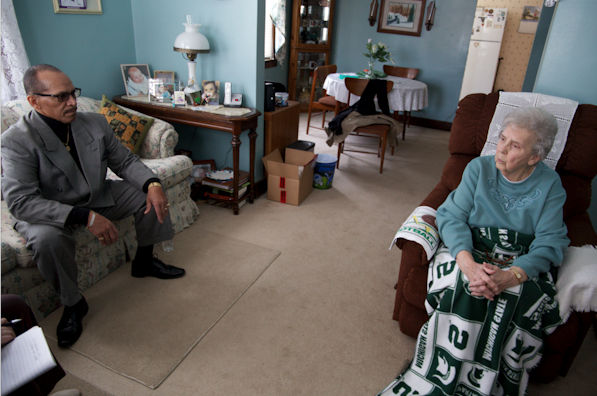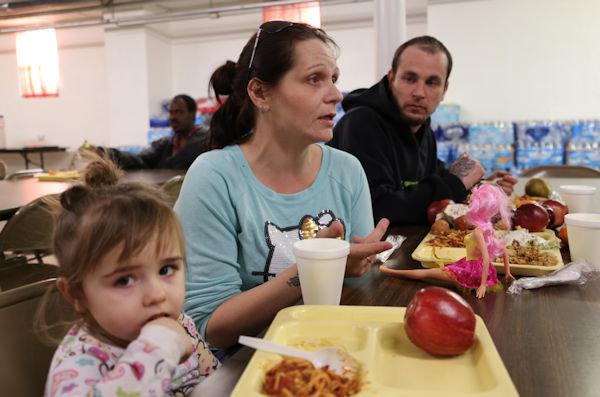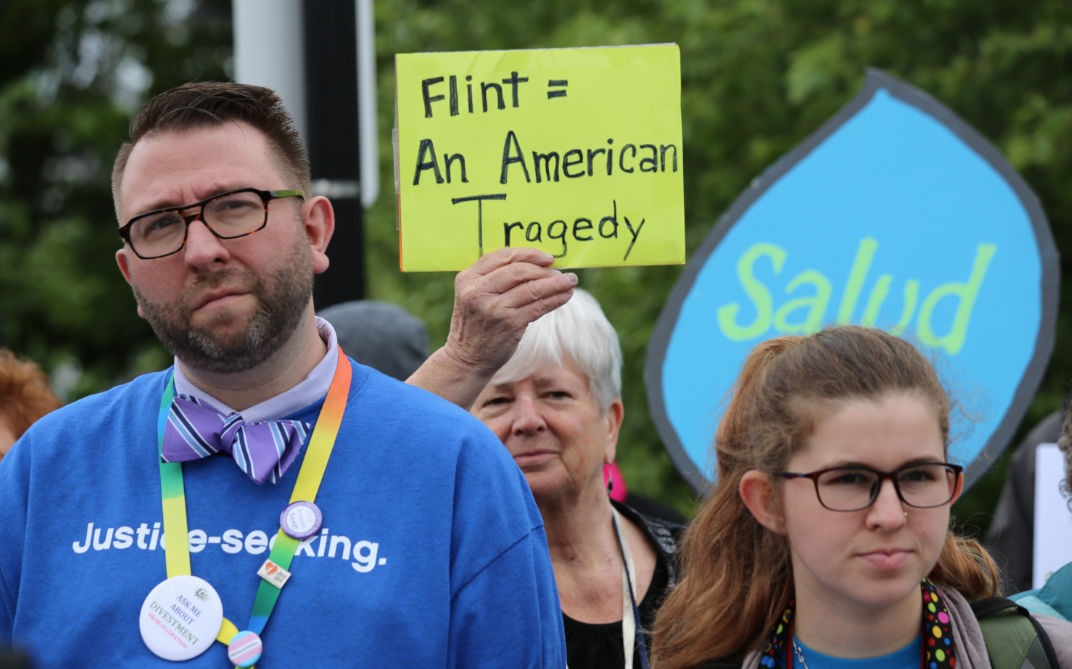Education, nutrition and advocacy go beyond bottled water in the latest recovery efforts.
KAY DEMOSS
Senior Editor-Writer, Michigan Area
It’s been almost a year since the residents of Flint, Michigan had to turn off the tap and rely on bottled water. The Crossroads District of The United Methodist Church mobilized early to combat the effects of contaminants in the city’s drinking supply. Partnering with The United Methodist Committee on Relief and a coalition of community agencies, testing kits, water filters, Zero-Water pitchers and hundreds of cases of bottled water became available at Water Resource Centers set up in United Methodist churches.
Michigan Area United Methodists and many others have supported the effort mightily, both with supplies and with dollars. To date over $405,757 has been contributed: $393,038 to the initial Emergency Appeal and $12,719 to the Bishop Kiesey Children’s Fund.
The response is now at a turning point. Focus is shifting from emergency relief to long-term recovery and the leader of this transition is Greg Timmons.
MIConnect contacted Greg for an update. From his office at Court Street United Methodist Church, Greg says that progress has been made on a number of fronts. He cites four key aspects of the recovery task.
Unsafe water
“Let’s start with water quality,” he says. The level of contaminants has been cut in half, just below the federal government’s actionable point. “This does not mean that the water is safe to drink, but it is no longer industrially toxic,” Greg remarks.
There is general disbelief in government when it comes to water quality. “People don’t trust the filters,” Greg says, so they continue to depend on bottled water. He urges the development of how-to videos that will increase understanding about the filtration process. Many families have been drinking, cooking and washing with bottled water for ten months, suffering a high level of inconvenience. “So there is stress and fear and depression about water supply,” Greg notes, that bottles of water and skin lotion cannot totally relieve.
Greg has first-hand knowledge of the effects the crisis has on body and spirit. The Timmons family lives in the area of Flint with the poorest water quality. He attests to the cost to a family’s budget and wellbeing through purchase of emollients, stomach medications and even surgery. “My son has problems he never experienced until we moved to Flint from Holly,” Greg shares.

Healthy food
The second aspect of recovery that Greg is engaging is nutrition. “There are foods that help mitigate lead,” he says. “Proper eating can’t take the lead out of one’s system but it keeps a body from absorbing more lead.” Proteins, iron-rich and vitamin C-high products are desirable but not cheap. “The Resource Group, a coalition of government, non-profit and faith-based groups, is establishing two HUBS that will disseminate fruit, vegetables and protein along with bottled water, lotions and salves.
Bethel United Methodist Church and Greater Holy Temple are being established as HUBS. About 300 cars a day are expected to drive-up and receive water and food. Other supplies as well as counseling are available inside the buildings. Mental health therapists, provided by Genesee Health Systems, are present at the HUBS once or twice a week. In addition, Bethel UMC has recruited volunteers who are ready to pray with persons who enter the building seeking such support. HUBS are open four days a week, six hours a day. At the same time, the Water Resource Centers remain open at other United Methodist churches around the city.
Economic concerns
Employment is the third element of healthy recovery that Greg identifies. “There is a dire need for jobs here in Flint,” he says. The HUBS are collaborating with Michigan Works! — a workforce development organization serving employers and job seekers in the state – to provide jobs passing out water at the churches and delivering supplies door-to-door.
However, according to Greg, there are a number of obstacles to employability, including driving infractions and criminal record. “And if a person has been unemployed for five years or more, that person will not be considered. So the cycle of poverty continues.” Greg looks ahead to the development of training programs that will teach interview techniques and workplace skills.
Added to the health concerns is the impact of personal property devaluation. “No one can sell their house,” Greg says. “The net worth of many property owners has depreciated to almost nothing.” As that happens for individuals, “it adds up to a decline in the net value of the City of Flint.”
The church’s initial response to the situation in Flint was the meeting of basic needs … water for drinking and washing. Greg acknowledges that the recovery phase tackles more complex needs … advocacy and political action are needed.

Engaging families
Timmons is most passionate about developing educational programs for children. In 2015 Bethel UMC hosted a Children’s Defense Fund Freedom School aimed at improving the reading levels of children in the inner city. The program was possible through support of the Cynthia Estrada Fund. Fifty children participated and Greg would like to expand this program to involve 150 children.
He shares some dreams. “I want us to build hope and self-esteem in each child,” he emphasizes. This means investing in the development of creative programs beyond brick-and-mortar for infrastructure. For instance, the Flint Museum and Kettering University are exploring the creation of a series of touch-and-feel experience for the city’s children. Churches may serve as base locations for these learning-is-fun events.
Another idea on Greg’s drawing board is the use of Christian rap to reach youth in the city. “There are artists that have expressed concern for Flint,” he notes. “I want to say to them, ‘Please, show up and do something!’”
What the church can do
Greg admits to being “a grandpa-daddy who wants to save souls and change lives.” He cites two things that can make a big difference: dollars and advocacy.
At the present time bottled water is being provided by the State though that could end at the close of this year. So this fall Greg puts the priority on cash donations: “We will need serious dollars that can be used toward education and other aspects of recovery.”
He is grateful that, “The church and concerned individuals have given us a ‘Hope Chest’ through contributions to the Flint Water Appeal and Children’s Fund.” He notes that the Crossroads District is being judicious regarding use of those gifts because “programs of the scope needed in the long-term will require exceptional amounts of money,” especially if city, state and federal funding is eliminated or falls short of what’s needed. So Greg and other Detroit Conference leaders are committed to being good stewards of the funds and to make each dollar stretch in light of the scope of community development work that lies ahead.

The second need is for political advocacy. Greg asks Michigan’s United Methodists to write their Congress people and ask them to declare Flint a federal disaster. “That allows us to receive funds to rebuild the infrastructure and to enable economic development that will put people back to work,” Greg insists.
There are many practical concerns that demand the attention of this newly appointed Water Recovery Coordinator. But Greg says his deepest concern is peace. “Have you ever tried to talk to someone who has no peace? People who feel bugged and agitated are not able to focus their attention on what they need to listen to.” Greg believes followers of the Prince of Peace are in a special position to restore broken relationships.
“I want us to remember that we are not just a governmental agency passing out food and water,” he continues. “We are sharing as the gospel asks us to share for the sake of the Kingdom of God and to draw people to Jesus Christ.”
He concludes, “We United Methodists really, really, really need to make sure that if the State fails Flint’s people, we won’t fail them.”
Want to know more? Want to be a peacemaker among Flint residents? Contact Greg Timmons at 810-922-2257 ormailto:flintwater@miareaumc.org. Checks in support of these efforts may be sent online or mailed to Detroit Conference Treasurer, 1309 North Ballenger Hwy, Suite 1, Flint MI 48594.
Last Updated on December 8, 2023

